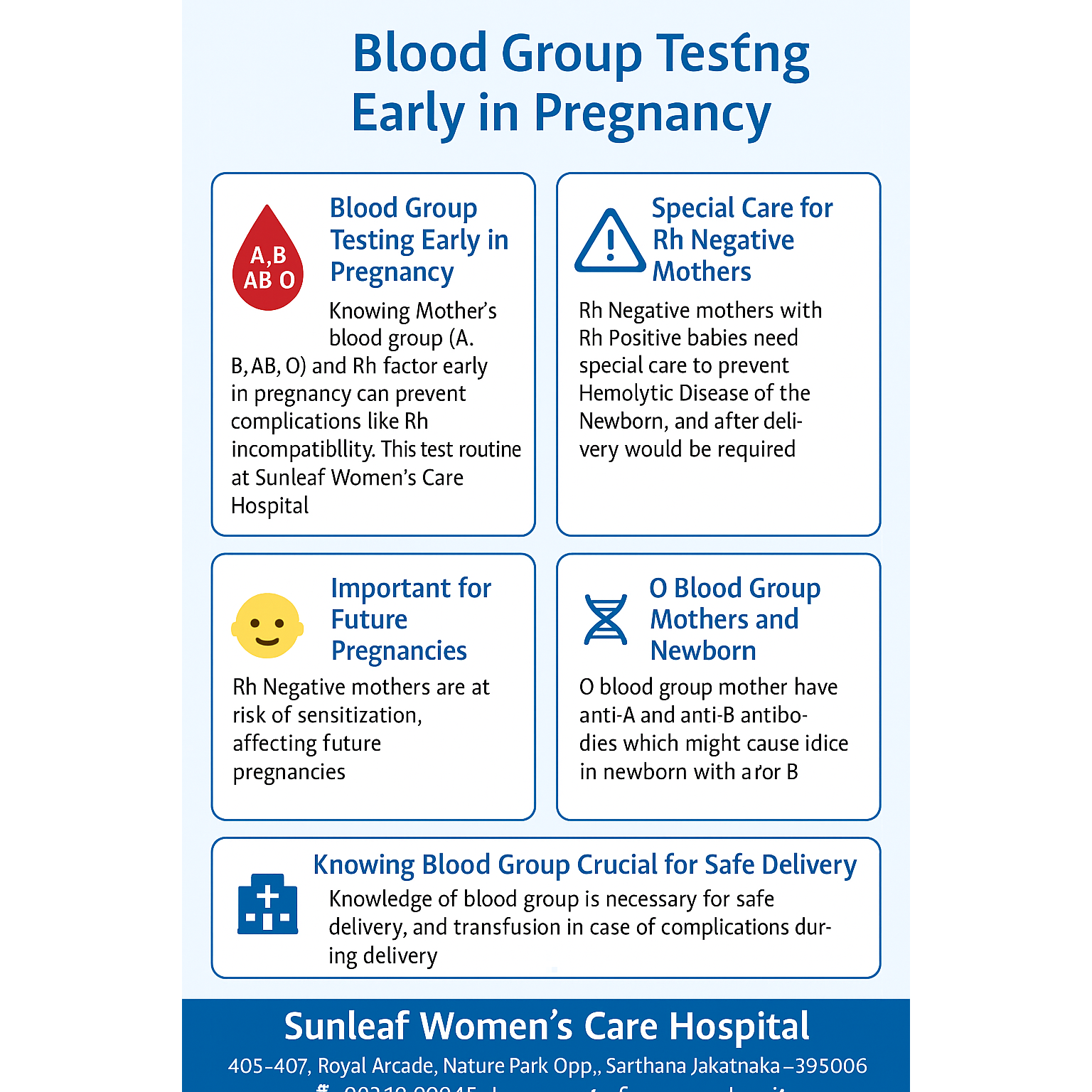+919824099945

This is your website preview.
Currently it only shows your basic business info. Start adding relevant business details such as description, images and products or services to gain your customers attention by using Boost 360 android app / iOS App / web portal.
BLOOD GROUP IN PREGNANCY- SUNLEAF WOMEN'S CARE HOSPITAL

Why Blood Group Testing Matters in Pregnancy: A Guide for Expecting Mothers By Dr. Mukesh Dobariya AND Dr. Krishna Jiyani At Sunleaf Women's Care Hospital, we believe every pregnancy journey deserves the highest level of care. One of the most essential – but often overlooked – aspects of early antenatal care is knowing your blood group and Rh type. This small test can make a big difference in protecting both mother and baby during pregnancy. Let’s understand why this matters, and what global guidelines like RCOG (UK) and ACOG (USA) recommend. ✅ 1. Early Blood Group & Antibody Testing is a Must As per both RCOG and ACOG guidelines, blood group and Rh typing should be done at your very first antenatal visit, ideally before 12 weeks. 🧪 The tests include: ABO Blood Group Rh (D) Factor Indirect Coombs Test (ICT or Antibody Screening) At Sunleaf, we include this in our routine pregnancy panel, ensuring no delays in your care. ⚠️ 2. What If You're Rh-Negative? If a mother is Rh-negative and the baby is Rh-positive, there is a risk of Rh incompatibility. This can lead to a serious condition called hemolytic disease of the newborn (HDN) if not managed in time. Such risks increase during: Delivery or miscarriage Invasive procedures like amniocentesis Abdominal trauma during pregnancy 💡 Good news: HDN is preventable with proper care and timely medication. 💉 3. Anti-D Injection: Your Pregnancy Shield Both RCOG and ACOG recommend that all Rh-negative, non-sensitized mothers should receive Anti-D immunoglobulin (RhIG) at:28 weeks of pregnancy (routine prophylaxis) Within 72 hours of any sensitizing event (e.g., bleeding, trauma) Post-delivery, if your baby is confirmed Rh-positive At Sunleaf Women’s Care, we follow this strictly to prevent Rh sensitization and protect your future pregnancies too. 🧬 4. What if Antibodies are Already Present? In some women, the antibody test (ICT) may come positive –indicating previous sensitization. In such cases, we: Monitor antibody levels regularly (every 4 weeks until 28 weeks, then every 2 weeks) Use MCA Doppler ultrasound to check for signs of fetal anemia Arrange for advanced care like intrauterine transfusion or timely delivery, if needed 🌐 5. Newer Advances: Fetal Rh Testing via DNA In many countries, cell-free DNA testing can identify the baby’s Rh status from a maternal blood sample. This helps avoid unnecessary anti-D injections if the baby is Rh-negative. Although this isn’t routine in India yet, we stay updated with such technologies at Sunleaf Hospital, ensuring the best pregnancy care in Surat. 👶 In Summary: Your blood group is more than just a label. It plays a key role in safe pregnancy care. 💗 At Sunleaf Women’s Care Hospital, Varachha: We ensure early testing, Provide timely Anti-D protection, and Monitor your baby’s well-being with the latest fetal medicine protocols. 📍Sunleaf Women's Care Hospital 405–407, Royal Arcade, Opp. Nature Park, Sarthana Jakatnaka, Surat – 395006 📞 Call us: 98240 99945 🌐 www.sunleafwomencarehospital.com best pregnancy care in Surat, IVF in Surat, gynecologist in Varachha, Sunleaf Hospital

